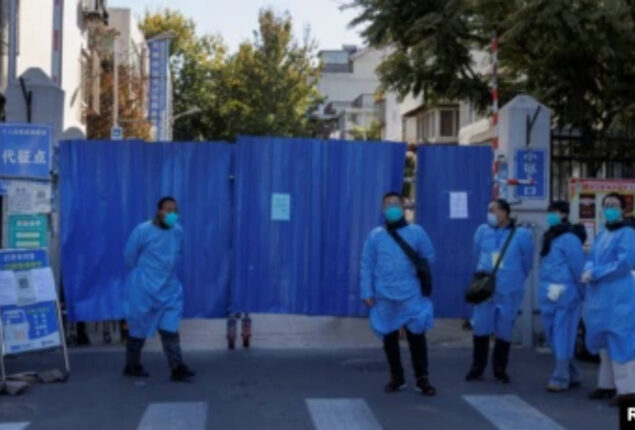Wuhan stay top after retaliate sees off Guangzhou
Table-garnish Wuhan Three Towns proceeded with their unbeaten beginning to the Chinese...

Guangzhou largely shut downs as Covid spreads
Guangzhou recorded 2,637 local infections on Tuesday, making up roughly one-third of all new cases in China, where infection rates are at a six-month high.
The 19 million-person city has emerged as the focal point of China’s most recent Covid outbreak, recording more than 1,000 new cases for four straight days, a high number by the nation’s zero-Covid standards.
China continues to insist on utilizing immediate lockdowns, widespread testing, thorough contact tracing, and quarantines to eradicate infections as soon as they appear, even as the rest of the globe advances past the pandemic.
The highly transmissible Omicron variety has posed a growing threat to the zero-tolerance policy, and its high economic and social consequences have sparked growing public outrage.
The current outbreak in Guangzhou is the worst to have struck the city since the pandemic began.
The city serves as the provincial headquarters of Guangdong, which is one of China’s most important economic hubs and a key center for manufacturing.
The majority of cases in Guangzhou have been concentrated in the Haizhu district, a primarily residential metropolitan area on the Pearl River’s southern bank.
Last Saturday, Haizhu was placed under lockdown. Residents were instructed not to leave their homes unless absolutely essential, and all public transportation, including buses and subways, was shut down. Originally planned to last three days, the lockdown has now been extended through Friday.
As the infection spread to further areas, two more districts were shut down on Wednesday.
West of the city’s Liwan neighbourhood residents woke up to a directive to remain inside unless absolutely essential. All schools in the district were instructed to move their classes online, close their daycare facilities, and lock down their campuses. Restaurant dining was prohibited, and all businesses were told to close save for those who supplied necessities.
A third district, the remote Panyu, announced a lockdown on Wednesday afternoon that will extend until Sunday. Private automobiles and bicycles were also outlawed in the district.
Over 40 subway stations have been closed as part of the citywide rollout of mass testing in nine districts.
Residents who were regarded to be close contacts of infected people—which in China can include neighbors, those who shared a building with them, or even residents of the same residential compound—were sent in large groups to centralized quarantine facilities.
“At present, there is still the risk of community spread in non-risk areas, and the outbreak remains severe and complex,” Zhang Yi, deputy director of the Guangzhou municipal health commission, told a news conference Tuesday.
The lockdown so far seems to be more focused and less severe than those observed in several other places.
While residents of high-risk neighborhoods are prohibited from leaving their homes, those who live in so-called low-risk zones within closed down districts are permitted to leave their homes to get groceries and other necessities.
However, many worry that if the infection spreads further, a complete lockdown of the city may be on the horizon.
Residents of Guangzhou publish charts on WeChat, China’s super app, comparing the soaring caseload there with Shanghai’s in late March, just before the eastern financial hub’s brutal two-month lockdown.
When the city reported 3,500 daily infections, Shanghai officials originally denied that a citywide lockdown was required, but eventually implemented one.
Anticipating that worse is to come, many residents in Guangzhou have stocked up on food and other supplies. “I’ve been buying (groceries and snacks) online like crazy.
I’ll probably end up eating leftovers for a month,” said one resident, whose area of Haizhu district was categorized as low-risk by authorities.
Others have turned to social media to voice their annoyance with the guidelines and testing requirements. Weibo, China’s Twitter-like platform, has seen a rise in tweets criticizing zero-Covid restrictions using local Cantonese language and expletives. These posts appear to have mostly escaped the notice of internet censors who do not speak Cantonese.
“I learn Cantonese curse words in real-time hot search everyday,” one Weibo user said.
Local governments around the country are being pushed to tighten Covid control measures amid growing public resentment.
Videos of Covid employees beating up homeowners while covered head to toe in hazardous suits went popular online last week.
Seven Covid employees were detained after an altercation with locals, according to a statement released by authorities in Linyi city, Shandong province, in response to a public uproar.
Catch all the China News, World News, Breaking News Event and Latest News Updates on The BOL News
Download The BOL News App to get the Daily News Update & Follow us on Google News.